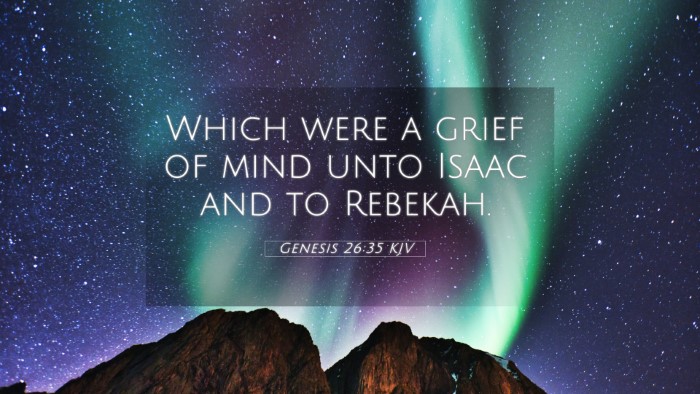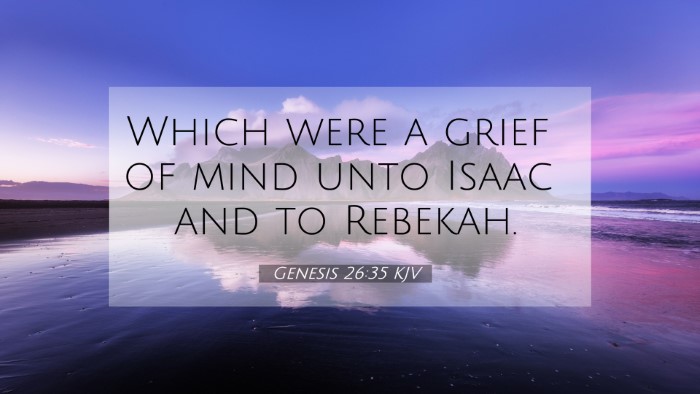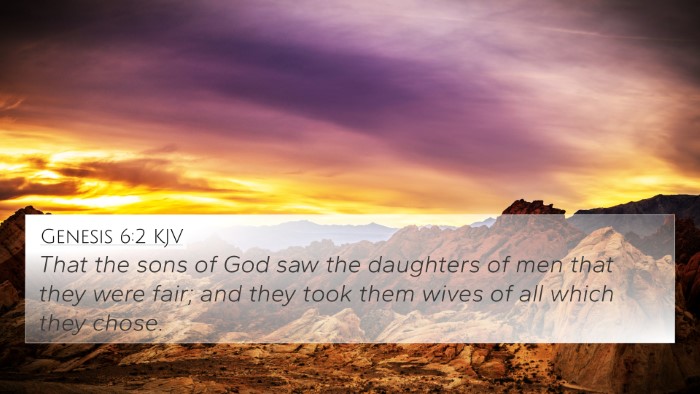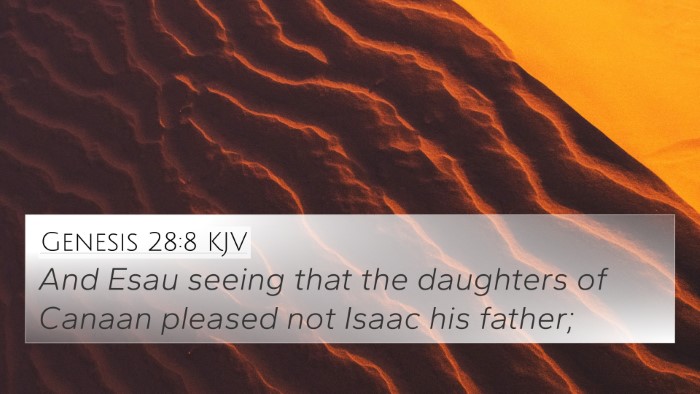Meaning and Interpretation of Genesis 26:35
Genesis 26:35 states: "But they were a grief of mind to Isaac and Rebekah."
This verse highlights a significant moment in the life of Isaac and Rebekah, reflecting their distress regarding the choices made by their sons. The context surrounds the marriages of Esau, which were not in line with the values and traditions expected by their family. To understand this verse comprehensively, we can analyze it with insights from public domain commentaries and cross-reference it with related Bible verses.
Contextual Analysis
The narrative of Genesis 26 depicts Isaac's challenges and blessings. Following God's promises to Abraham, Isaac faces his own trials including famine and the rivalry with Abimelech. The marriages of Esau are introduced to underline personal and familial strife in the blessed line.
Insights from Public Domain Commentaries
-
Matthew Henry:
Henry emphasizes the emotional turmoil caused by Esau's choices, noting how their marriages to Hittite women created enmity in the family, contrasting their faith with the values of the surrounding peoples. He reflects on how familial relationships can strain one's spiritual journey.
-
Albert Barnes:
Barnes discusses the cultural implications of intermarriage and observes how these decisions could deviate from God’s intention, causing heartache and despair. He notes that Isaac and Rebekah's sorrow indicates a deeper concern for the faith and destiny of their lineage.
-
Adam Clarke:
Clarke draws attention to the Hebrew meaning of 'grief', interpreting it as a source of bitterness and sorrow. He encourages readers to understand the weight of parental expectations and the significance of aligning relational choices with spiritual values.
Bible Verse Cross-References
To further understand Genesis 26:35, we can explore various Bible verses that relate to similar themes of family, marriage, and the repercussions of choices. Here are some significant cross-references:
- Genesis 27:46: "And Rebekah said to Isaac, I am weary of my life because of the daughters of Heth..." - This verse illustrates Rebekah’s ongoing grief over Esau's choices, reinforcing the emotional distress caused by relationships outside their faith.
- Genesis 28:1-2: "And Isaac called Jacob, and blessed him, and charged him, and said unto him, Thou shalt not take a wife of the daughters of Canaan." - Here, Isaac directs Jacob to choose a wife from his own people, indicating his desire to rectify his family's direction.
- Deuteronomy 7:3-4: "Neither shalt thou make marriages with them; thy daughter thou shalt not give unto his son, nor his daughter shalt thou take unto thy son..." - A direct warning against marrying outside the faith context, highlighting the biblical principle of marrying within one’s beliefs.
- Malachi 2:15: "And did not he make one? Yet had he the residue of the spirit. And wherefore one? That he might seek a godly seed..." - This suggests the significance of godliness in marriage concerning lineage and legacy.
- 2 Corinthians 6:14: "Be ye not unequally yoked together with unbelievers..." - Paul's admonition about the spiritual integrity required in partnerships emphasizes the same sentiment found within Genesis 26:35.
- Proverbs 22:6: "Train up a child in the way he should go: and when he is old, he will not depart from it." - Highlights the importance of guiding children in their choices, reflecting Isaac and Rebekah’s desires for their sons.
- Ephesians 6:4: "And, ye fathers, provoke not your children to wrath: but bring them up in the nurture and admonition of the Lord." - Encourages a nurturing approach to parenting, crucial to avoiding grief in familial relationships.
Thematic Connections
The overarching theme represented in Genesis 26:35 includes:
- Family Dynamics: The strife caused by Esau's marriages serves as a critical reminder of the potential conflict between personal choice and familial expectations.
- Cultural Values: The contrasting values between the chosen family and the Hittites symbolize broader conflicts encountered in spiritual adherence.
- Faith and Guidance: Parents' roles in guiding their children into righteous paths echo throughout scripture, resonating with teachings on the desired godly seed.
Conclusion
Genesis 26:35 invites readers to reflect on the implications of personal choices and their ripple effects on family and faith. The commentaries by Henry, Barnes, and Clarke offer substantial insights into the emotional and spiritual dynamics at play. Understanding these connections through cross-references helps to deepen the comprehension of this important biblical narrative and its teachings. Through the lens of inter-Biblical dialogue, we see how themes woven throughout scripture continue to resonate in modern faith contexts.





